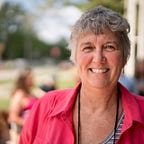Famous for being Famous Post-Covid
Anybody remember Gladys Glover?
Last night I watched the 1954 Judy Holliday film It Should Happen to You, Jack Lemmon’s first major role, directed by George Cukor. Holliday, most famous for winning the Best Actress Academy Award for her role as “brassy blonde” Billie Dawn in Cukor’s 1950 film Born Yesterday, plays true to type. In what is said to be her least sympathetic role, she plays Gladys Glover, a model/actress who has come to New York to make a name for herself. When she can’t seem to do that (having been fired from a girdle ad for being 3/4 inch too large), she takes the money she’s saved and purchases a billboard in Columbus Circle, on which she has her name painted. The billboard has the added benefit of being visible, just barely, from her apartment window.
Gladys leverages the prime ad spot for six others, one in lights! with an ad man who wants it more. In Macy’s, she causes a stir when she tells the sales clerk to deliver some towels to her address, and the clerks and customers all want her autograph.
Jack Lemmon, a documentary filmmaker courting her after seeing her shoeless and feeding pigeons in the park, is disgusted by her billboards at first sight. He tells her that people need to stand for something. Basically, people need to do something to get noticed, something worthwhile. Also, it is better to be known for something good on one’s own block than to be famous for nothing across the world.
Nope. Gladys would rather just see her name in lights, even if she’s paying. And it works — in addition to the autographs, she becomes an “influencer,” giving advice on low-brow television shows. Although Lemmon’s character Pete, and others, call her a freak.
My Instagram feed has gotten disturbing lately. And not just my feed, where I follow mostly local farmers but also family and friends, but stories from friends about their adult children as well. It seems that during Covid, many young adults in my sphere heard about “passive income.” And they are either participating in short-selling trading and crypto-currency speculating of the kind that crashed Gamestop, or they are trying to fashion themselves as influencers, using their social media to create an online persona that will bring them free goods and money just by, you know, having fun and looking cute. They want to get paid for being something or someone they are not.
If they stand for anything at all, it is for unbridled consumption.
When I complained to one friend, using the most derogatory term in my vocabulary, because it seems so true, “capitalist whore,” she asked how a successful young influencer is different from a model.
When modeling, the advertiser purchases your time to make an ad, an artifice, to sell something. Everyone understands you are not appearing as yourself in the ad, but have been made up and dressed up to suit the product and company’s need. After your photo shoot, you’re done. The company gets the pictures. You go home.
In the Instagram world, you monetize every action you take, every outfit you wear, your home, neighborhood, coffee shop, every product you eat and drink — your lifestyle is monetized. And you keep it up. It strikes me that there is nothing passive about this income, except you’re contributing nothing of value to the world.
I’m worried about how this thing, which started before Covid, is amplified by Covid. Entrepreneurs and companies are flooding back into the market with every stupid thing they’ve thought of (my personal favorite is an app-based service that will deliver a small picnic blanket and some drinks to you and your friends in a New York City park) while in quarantine. As individuals were stuck with just their technology, they became even more self-focused than before. Not to mention loss of purpose, loss of direction, confusion over what the world looks like and is now and going forward.
Decades ago, I was told by a literary agent that in order to be successful, I needed a platform. I should focus on one thing and become an expert, speak on it, write on it, gather followers. I mulled over this idea for a long time, but there was nothing, really nothing, that I wanted to be defined by. A couple years ago I heard Joyce Carol Oates give a reading, and she said her editor also pressured her constantly to build her platform online. She’d taken to Twitter (which she said, since it had become all about politics, was much less fun than the early days) to tweet almost exclusively about animal rights.
I think Oates had the right idea. Long past the time when one would seem to need to build one’s platform (after all she’s contributed so much to American Letters), she looked at what she wanted her online community to be about, and it was not what kind of coffee she drinks or where, her famous friends, her clothing, her apartment. I don’t think her editor was happy about it.
I don’t like this at all. Because I want people to live rich lives, rooted in relationships and community and a vision of the world that goes beneath the surface. I want people to be able to change and grow and yes, I want people to stop buying so much. I want people to find joy not in seeing their names on billboards, not in counting their followers, not in the free stuff they get. I want people to find joy in their reputation on their own block. Modeling can be a means to a well-lived life, but this is not modeling. Gladys Glover almost lost the love of Pete Sheppard for a glamorous, but shallow, life. It should not happen to you.
“It Should Happen to You” and other Judy Holliday films are now streaming on the Criterion Channel.
